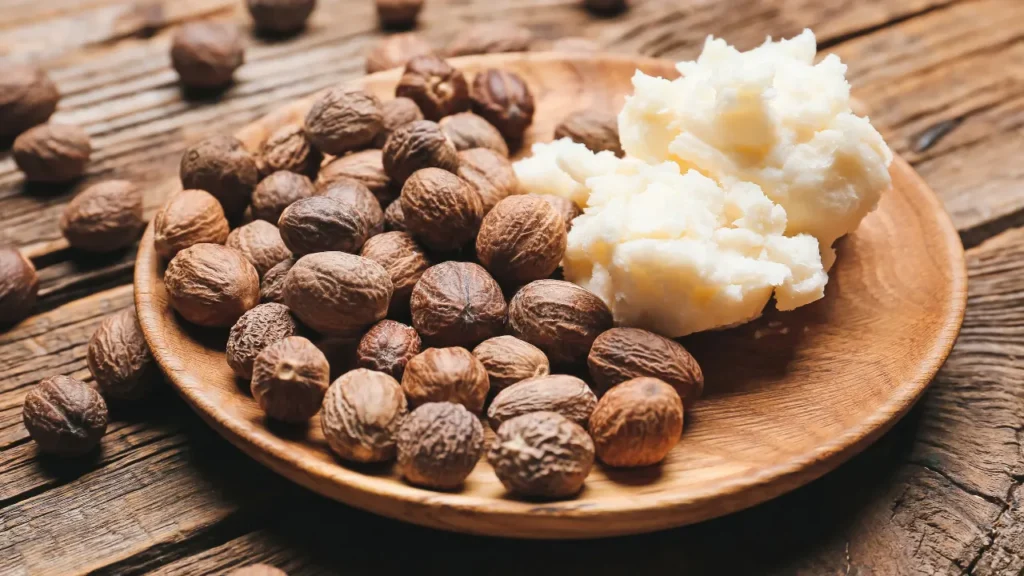Shea butter is made from the nuts of the West African shea tree (Vitellaria paradoxa), which has long been prized for its numerous nutritional, therapeutic, and moisturizing qualities. Shea butter has been used for centuries in African pharmacies and has recently gained popularity in the worldwide cosmetic business. However, its medicinal benefits go much beyond cosmetic benefits. This page explores the chemistry of shea butter, including its potential health advantages, best dosages, adverse effects, interactions with other substances, and its intriguing use as a nootropic supplement to improve attention, alertness, and cognitive function.
You May Also Like:
CBD for Concentration: 3 Epic Benefits that Boost Your Focus
Sunmed CBD vs. Partnered Process CBD: Finding the Best CBD for Sleep
Shea Butter: Benefits, Dosage, Side Effects, Drug Interactions, and Other Important Information is an original (NootropicsPlanet) article.
Nature of Shea Butter
The nuts of the shea tree (Vitellaria paradoxa) are the natural source of shea butter. There are two main types of it: refined and unrefined. The latter is less processed and still has most of its original characteristics. Its unique makeup comprises bioactive ingredients and a high fatty acid content, supporting its medicinal qualities. Depending on where it comes from and how it was extracted, shea butter can have a soft, creamy texture or a more solid form at room temperature in terms of consistency and nutrient profile.
Health Benefits of Shea Butter
Shea butter’s anti-inflammatory and antioxidant qualities are the main reasons it is used as a nootropic. The pathophysiology of neurodegenerative disorders and cognitive decline is linked to chronic inflammation and oxidative stress, which are acknowledged enemies of cognitive function. Shea butter may have neuroprotective effects by reducing certain disorders.
- Antioxidant Properties: The tocopherols in shea butter neutralize free radicals, protecting neuronal cells from oxidative damage. This mechanism is critical in maintaining cognitive functions and potentially averting age-related cognitive decline.
- Anti-inflammatory Effects: The triterpenes and other anti-inflammatory compounds in shea butter can inhibit pro-inflammatory cytokines, offering protection against neuroinflammation, a factor in cognitive impairment and various neurological conditions.

Chemistry of Shea Butter
The numerous advantages of shea butter are primarily due to its distinct chemical makeup. It is mainly made up of triglycerides and contains many unsaponifiable matter (between 5 and 10%). It is also high in fatty acids, including oleic, stearic, linoleic, and palmitic acids. Much of the credit for the unsaponifiable fraction’s anti-inflammatory and antioxidant qualities goes to its rich supply of bioactive chemicals, including tocopherols (vitamin E), catechins, triterpenes, and sterols (stigmasterol, shea sterol). Together, these elements alter the lipid profile of cell membranes, modifying permeability and fluidity, which may indirectly impact the health and function of neurons.
Physiological Mechanism of Action
- On the Skin: Topically applied shea butter acts as an emollient, forming a barrier on the skin’s surface that locks in moisture, promotes hydration, and enhances skin barrier function. Its anti-inflammatory compounds, such as triterpenes, reduce cytokine production, thereby mitigating skin inflammation and irritation.
- Antioxidant Activity: The presence of tocopherols (vitamin E) and other antioxidants in shea butter helps neutralize free radicals, reducing oxidative stress within cells. This activity is crucial for skin health and protecting brain cells from oxidative damage, which can lead to cognitive decline.
- Anti-inflammatory Effects on the Brain: Shea butter’s anti-inflammatory properties extend to the brain, potentially reducing neuroinflammation, a critical factor in cognitive impairment and neurodegenerative diseases. The mechanism likely involves the inhibiting pro-inflammatory cytokine production and modulation of immune cell activity within the brain, contributing to a neuroprotective environment conducive to cognitive health.
- Lipid Profile Modification: The fatty acids in shea butter may influence the lipid composition of cell membranes, including those of neurons, affecting membrane fluidity and the function of membrane-bound proteins and receptors. This modulation could impact neuronal signaling, plasticity, and overall brain health, although direct effects on cognition and alertness require further investigation.


Optimal Dosage of Shea Butter
It is difficult to determine the ideal dosage of shea butter because there are few clinical trials, especially when using it as a nootropic. Most research concentrates on topical treatments rather than ingestion or other delivery methods associated with nootropic effects. As with any supplement, it’s wise to begin with modest dosages and gradually increase to determine your tolerance and response. It is best to speak with a healthcare professional to customize the dosage based on each person’s unique health profile and objectives.
Side Effects of Shea Butter
Shea butter has rare instances of allergic reactions, mainly in those with tree nut allergies, and is generally considered safe for topical application. Prudence is advised because the safety profile of oral consumption is still less well-established. Though rare, possible adverse effects could include allergic reactions or gastrointestinal upset. Oral administration’s long-term effects have not yet been thoroughly studied.


Potential Substance Interactions with Shea Butter
There is little information on how shea butter interacts with other vitamins and drugs, particularly when taken orally. Given its impact on inflammation and oxidative stress, it may hypothetically interact with anti-inflammatory medications, anticoagulants, or antioxidant supplements, either enhancing or reducing their benefits. Therefore, before including shea butter into their regimen, people taking medication should speak with healthcare providers.
Best Responsible Uses of Shea Butter
For those interested in exploring shea butter as a nootropic:
- Consultation with Healthcare Professionals: It is essential to seek advice from a healthcare provider before starting any new supplement, especially for cognitive enhancement.
- Quality and Purity: Opt for high-quality, unrefined shea butter products to maximize bioactive components and minimize contaminants.
- Start Low, Go Slow: Start with small doses and monitor for adverse reactions or side effects, adjusting as necessary.
- Holistic Approach: To support cognitive health, combine shea butter supplementation with a healthy lifestyle, including a balanced diet, regular exercise, and adequate sleep.
Shea Butter:
Conclusion
While shea butter is primarily recognized for its skincare benefits, its potential as a nutritional supplement has been explored less, but it holds promise. Limited research suggests that consuming shea butter may contribute to overall health and well-being by providing essential nutrients and potentially exerting antioxidant and anti-inflammatory effects. Some studies indicate that the components of shea butter, such as oleic acid and stearic acid, may positively impact cholesterol levels and cardiovascular health.
However, it’s important to note that shea butter is high in calories and saturated fats, which may pose concerns for individuals with specific dietary restrictions or health conditions. Additionally, the evidence supporting shea butter as a nutritional supplement is still emerging, and more robust clinical trials are needed to establish its efficacy and safety. Although shea butter may offer nutritional benefits, its consumption should be cautiously approached, and individuals are advised to consult with healthcare professionals before incorporating it into their diets, especially in significant quantities.


References:
- What are the benefits of shea butter? Retrieved from:https://www.medicalnewstoday.com/articles/shea-butter-benefits
- Shea Butter – Uses, Side Effects, and More. Retrieved from: https://www.webmd.com/vitamins/ai/ingredientmono-1512/shea-butter
- Cooking with shea butter is associated with lower blood pressure in the Ghanaian population. Retrieved from: https://pubmed.ncbi.nlm.nih.gov/30967105/
Important Note: The information contained in this article is for general informational purposes only, and should not be construed as health or medical advice, nor is it intended to diagnose, prevent, treat, or cure any disease or health condition. Before embarking on any diet, fitness regimen, or program of nutritional supplementation, it is advisable to consult your healthcare professional in order to determine its safety and probable efficacy in terms of your individual state of health.
Regarding Nutritional Supplements Or Other Non-Prescription Health Products: If any nutritional supplements or other non-prescription health products are mentioned in the foregoing article, any claims or statements made about them have not been evaluated by the U.S. Food and Drug Administration, and such nutritional supplements or other health products are not intended to diagnose, treat, cure, or prevent any disease.
